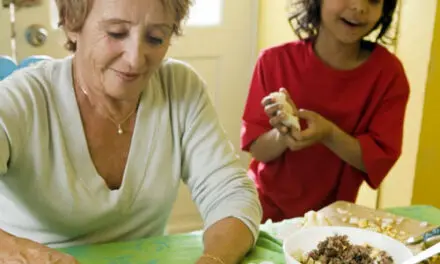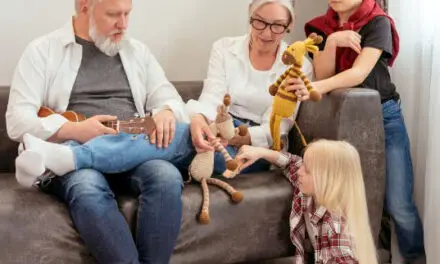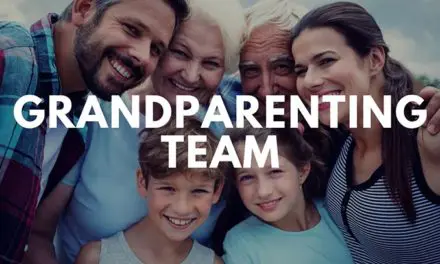by Carolynn J. Scully
Eighteen years ago, my husband and I waited expectantly for the arrival of our first grandchild. We were excited, happy, and curious about grandparenting. Just like new parents, we had no inkling as to how much grandchildren would change our lives. We heard from other grandparents that it was the best thing in the world, and that we could love on the babies and send them home when they cried. This was not nearly enough information. We also found that some of it was false. There are still times when our heart breaks over our grandchildren, just as it did over our own kids. Grandparenting is not always a joyous role.
Over the years we have been blessed with seven grandchildren and have learned so much from our experiences with them and their parents. Our involvement in this grand adventure stretches from being daily caretakers, to having the grandchildren and parents live with us, to loving them from a distance. I hope to share with you lessons I think apply to almost all grandparents.

What roles do grandparent play? Here are 5 that I’ve seen and experienced.
Babysitter
Most grandparents would admit that the expectation they are most often confronted with is babysitting. I found that babysitting became my daily job because I was available to bless our children with inexpensive childcare. I wanted to do it, but it is not always something a grandparent desires or is equipped to handle. Babysitting, even with grandchildren, is sometimes a chore and an inconvenience, and I do not recommend allowing it to grow into a habit.
When babysitting is demanded of us, honesty is paramount. There should be an understanding from the beginning that you are free to say “no” when you can’t or don’t want to watch the little ones. As in all relationships, communication will go far to help avoid conflicts. Babysitting can be a time to bless the parents and also bless the grands. We should see it as an opportunity to build love, faith and wisdom into our legacy, their future.
Rule Follower
There is a saying that goes, “What happens at Grandma’s house stays at Grandma’s house.” Unfortunately, we hear all too often that grandparents feel they can do whatever they please because they are grandparents. But part of our job description should be to uphold the rules the parents have set in place. We need to be rule followers, not rule breakers. Teaching a child that he or she can break the parents’ rules when they aren’t looking can come back to haunt us, damage the relationship between the child and his parents, and ultimately harm the child we dearly love.
We must respect the hard-and-fast rules parents have set down. With other rules, we can be slightly lenient if we discuss it with the parents. Whenever my husband and I break the parental rules at our house, we are sure to confess our transgression at the first opportunity. If it was something we planned ahead of time, like keeping them up past their normal bedtime for a special activity, we ask permission beforehand and explain our reasoning. In any case, we are careful to be totally honest with the parents. In that way, we honor their position and show the children that they must honor their father and mother as God has commanded. We must remember that we are secondary in the lives of our grands, and their parents are primary.
Story-Teller
Grandparents have many stories to share, so it’s natural for us to tell them. We can delight future generations with tales of our past and the lessons we learned through mistakes and successes. My husband and I believe it’s important to talk about God as often as possible. Our grandchildren love to hear how God answered prayers, changed our hearts, or saved us from disasters. They appreciate when we learn to tell the wonderful old biblical histories in a new and fresh way, as we see them again through the young eyes of the next generation.
We also tell stories about our childhood friends and other adventures and activities from our younger years, and our granddaughters and grandsons are amazed to hear them. They often keep asking us for “one more story” about our childhood. Even our older grands have asked for those stories. Recently, they asked about love interests we had before we found each other. The big question they finally asked was, “How did you know when you found the right one?” That’s a notable example of how stories often lead to discussions about life lessons and character issues.
Books chosen carefully tell stories that can also trigger good conversations. We love reading with our grands—reading a story to them or having them read to us. Literature, whether old favorites or new finds, can tell stories that resonate with young and old. I remember reading to my grandson, Scott, when he was only days old as I hovered over his crib in the NICU. He doesn’t remember, but I often tell him about those days. In this age of TV, videos, computers and apps, it may take some coaxing to get them to sit and listen, but I have found that if you start young, they remain interested when they sense a good story is in the air.
Become a premium member today and receive access to exclusive content as well as discounts on resources and training—all designed to help you improve as a grandparent and connect with your grandkids.
Memory-Maker
How will your grandchildren remember you? Were you the grandpa who took them fishing or on long walks or out in the yard to look up at the stars? Could you be the grandma who bakes the cookies or makes a pot of homemade soup?
We do holidays big in our family. Celebrations are filled with new and exciting activities wrapped together with long-held traditions. Our grands come to our house expecting to have fun, and we try not to disappoint. These kinds of memories and traditions are the best kind of inheritance we can leave to our descendants—even better than money or possessions. Of far more value are a godly birthright, important life lessons that will get them through life and save them untold problems, a deep and practical knowledge of the Scriptures, and a sense of family continuity.
Memories help give them roots. Grandparents tell the stories that root children in family history and faith history. Children must deal with rapid changes at home, at school and even inside their developing bodies. It is reassuring for them to know they are part of a larger, continuing story—the story of faith and family. Memory-makers leave a legacy.
Faith-Builder
3 John 4 is one of my favorite Scripture verses. It says: “I have no greater joy than to hear that my children are walking in the truth.” Of course, I’m also thinking about my grandchildren when I read that verse. Sharing our faith helps it to grow in us and plants seeds that will grow in our grandchildren. Prayer should always be our first step in helping them build trust in God. Through prayer we can seek the direction of the Holy Spirit and lead our loved ones closer to the Father by using our aged wisdom from a foundational faith, clothed with a listening ear.
Being an effective grandparent includes having a vulnerable, honest, and loving heart. As faith-builders, we will listen carefully to the hearts of our children and grandchildren, which is crucial to knowing how to respond as we seek to build up, not tear down. Also, our ongoing presence in our grandchildren’s lives can help them grow as Jesus grew “in wisdom and stature, and in favor with God and man” (Luke 2:52). Our roles can be important puzzle pieces to help complete the picture of a healthy, growing family.
So, what is our job description? We help to fill in the gaps between the generations. We provide connections between the future and the past (and our grandchildren do want to be connected). We take our roles seriously and work at them the best we can. We do have important roles to play!

Carolynn J. Scully is an award-winning poet and writes other works while caring for grandchildren, Abigail and Lincoln, after school. She has worked in women’s ministries for many years and enjoys speaking to women’s groups. She has been married to her husband, Patrick, for 47 years and lives in Forest City, Florida. Her book, Something Good Inside of Me: A Children’s Poetry Keepsake Journal, was written for her seven grandchildren and is available here.




